Spending time with your baby
Supporting infant mental well-being and your relationship with your baby
Mums, dads and main carers:
The world may feel like it has suddenly changed. This may be a good time to slow down and take time to get to know your baby better.
If you are feeling anxious and worrying about things, pause for a moment and try wondering about what your baby might be thinking or feeling.
Remember that their experience may be very different from yours. Your baby is very good at being focused on the now. Sometimes this way of being may help us too. It can take our minds off worrying about what might happen in the future. Spend a little time trying to see the world through your baby’s eyes. Take time to breathe; in particular, take a slow breath out, it helps you feel calmer. Your baby is sensitive to how you are feeling and if you are calmer that can help your baby too.
From birth, babies are born ready to relate.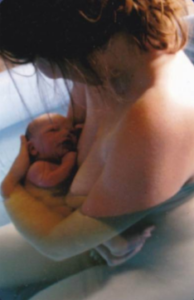
Your baby needs to build a relationship with you. They need to get to know you and you, themselves – so that you both grow together. Take some time to notice what your baby is feeling by looking at their expressions and body posture. Are they relaxed? Looking happy? Or frustrated? What is you baby interested in? What could you do to show that you understand?
When babies show us that they are ready to relate (engage) they will have bright eyes – with a new baby, just looking into one another’s eyes is really good for you
both. This will release lots of positive hormones in both of your bodies and can help you both feel in tune and relaxed. Your baby will love the sound of your voice! Sing to your baby, they will even recognise songs that you sang before they were born. You will notice your baby loves it when you copy their expressions – try making faces with your baby.
As your baby gets a bit older, share simple games like peek-a-boo or action songs.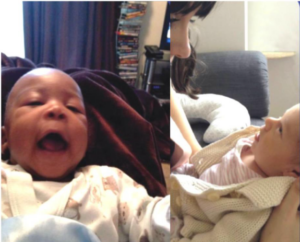
Laughter helps your brain feel safer. Find some time to share joy with your baby, in a simple way. Look out for their signs (cues) that they are ready to play, and also ones that tell you that they’re ready to stop or have had enough. Sometimes your baby enjoys a game but then after a while they will need a break.
Chat to your baby about what you see and what’s going on. They will engage with the sound of your voice and it helps them learn to understand you.
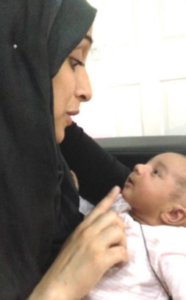 The more you are able to be in tune with your baby, the easier time will be to spend together. Babies don’t always fit into routines, however, if you are able to enjoy time with them, they can become your companion and you can both learn to fit into each other’s lives.
The more you are able to be in tune with your baby, the easier time will be to spend together. Babies don’t always fit into routines, however, if you are able to enjoy time with them, they can become your companion and you can both learn to fit into each other’s lives.
Doing everyday things together can help feelings of loneliness. You are together. Try having a bath together – skin-to-skin is great for you both, the warm water is relaxing too, splashing is also fun!
Share feeding times – it can be relaxing for both of you. Take time to enjoy these moments with your baby. If your baby is over 6 months, eat together – you can share tastes of foods and your baby will enjoy exploring food, in particular how it feels, and they will be learning lots too.
Your older baby can do much more, but they will still enjoy these things.
Going back to the familiar things, which help calm a baby, will calm an older child too. Babies and young children enjoy repetitive games, rhythms and familiar things such as toys or things that you do together. There is no need for lots of toys or busy interactions. For example, with an empty cardboard box, hide a toy in it, and enjoy the surprise of finding it, babies can enjoy this again and again and again. Quiet times are important too, this helps your child process all the things they are taking in. When you need to get on with daily tasks, see if there are simple ways to help your child join in – let them try sweeping, taking things out of the washing machine or wiping things with a cloth. Children learn by copying the things you do.
Games for different ages
The best time to play with your baby is when your baby is well fed and rested, with a clean nappy, and they look relaxed but bright eyed, looking around them, and seems settled and relaxed. If your baby sometimes doesn’t seem interested in playing with you—don’t worry, this is normal. Don’t be offended, come back and try again later when your baby is ready.
-
One of the best kinds of play you can do with a newborn is having conversations with them. Spend lots of time looking into their eyes and making big expressions with your face, like big smiles and surprised faces.
Talk to them gently. Watch what they do in return, whether they copy your face, or try to answer you. Imagine what they might be saying back to you if they could talk.
They might need to look away for a while as this kind of contact can be very intense for babies—if they do, just wait patiently until they are ready to engage again.
Around 3 months, your baby will also start to smile at you when you play and talk together. What does your baby’s smile tell you about what they are feeling?
Newborns also love bold patterns, like black and white stripes, or clothes with
 bold checks. Hold these near your baby’s face and move them slowly, allowing your baby to watch them.
bold checks. Hold these near your baby’s face and move them slowly, allowing your baby to watch them.Things with bold colours can also be attractive to babies. Wear a stripy t- shirt or scarf with a bold pattern and hold your baby so they can look at it from your knee.
Blowing bubbles that your baby can watch floating by can also be fun. Think about what these patterns make your baby think and feel. These activities are good for developing your baby’s sight.
Newborns are really interested in noises too. Make funny sounds with your mouth, like rolling or clicking your tongue, blowing raspberries, making ‘pop’ noises or ‘mamamama’ sounds.
If you have any toys that squeak or jingle or make a noise, try these out gently. Watch to see if your baby likes them and continue if they do. But remember, just like you, baby won’t always want to listen to noisy toys. They will be more interested in chatting with you.
Things from around the house work too, like scrunched up paper. What kind of face does your baby make when they hear different sounds?
Puzzled? Interested? Newborns have really sensitive skin. Gently rub them with your hands or ask your health visitor to show you some baby massage techniques.
 Baby massage has been shown to help babies to sleep and to learn. You can also try rubbing your baby with soft materials, like a sponge, a soft make-up brush, a soft pullover. They will love the different feelings on their body. Watch their reaction to see which textures they prefer.
Baby massage has been shown to help babies to sleep and to learn. You can also try rubbing your baby with soft materials, like a sponge, a soft make-up brush, a soft pullover. They will love the different feelings on their body. Watch their reaction to see which textures they prefer. -
Keep up the conversations, as your baby at this age will be starting to chat more with you. They will also smile more often at you and try to speak back to you. They will be practising their letter sounds, (like goo- goo) which is great for learning language. What do you think they could be trying to say?
 Even if you don’t think much of your singing voice, your baby will love hearing you sing—they might even try to join in with you in their own way. Lots of nursery rhymes have actions that go along with them. These are great fun to share with babies, even before they can join in themselves. With songs like ‘Wind the bobbin up’ you can hold your child’s hands and move them gently to make the actions with you. In a few months your baby will be able to make the actions by helping them to practise their motor skills.
Even if you don’t think much of your singing voice, your baby will love hearing you sing—they might even try to join in with you in their own way. Lots of nursery rhymes have actions that go along with them. These are great fun to share with babies, even before they can join in themselves. With songs like ‘Wind the bobbin up’ you can hold your child’s hands and move them gently to make the actions with you. In a few months your baby will be able to make the actions by helping them to practise their motor skills.From around four to five months of age, babies start to get better at using their hands, and they become really interested in objects—hitting, holding, dropping and picking up—fascinates them.
Babies are not yet able to combine their attention to people and objects at the same time, so it’s normal for them to look at your face less often than in the first four months.
You can help your baby by watching what they are interested in, joining in with them, and guessing what they might be thinking or trying to do as they play.
It won’t be until around the first birthday that they can combine attention properly, but the more practice they get the better.
Babies this age love colourful things, especially if they move. In the summer, it’s
 fun to sit with your baby under a tree so they can watch the light moving through the leaves overhead.
fun to sit with your baby under a tree so they can watch the light moving through the leaves overhead.Show them a fish tank or a birdcage if you’re passing a pet shop, where they can watch the brightly coloured fish and birds darting around. Watch their expression—what are they thinking? What captures their attention?
Just as lots of mums enjoy a massage, babies really like a gentle rub on their bodies. Before or after their bath, you can try rubbing their limbs gently with some baby lotion, while chatting or singing. Watch their reaction to see which parts they really enjoy, or which parts are too ticklish!
Babies are never too young for books and will enjoy them in different ways as they develop. Upside down or back to front, young babies will enjoy exploring the feel of books and playing with turning the pages. You can borrow books from your local children’s centre or library.
When you read the story, take it slowly and let your baby see the pictures. Do funny voices as you read to keep the story interesting.
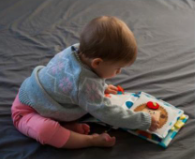 Watch to see what your baby looks at and which pages they really enjoy. This is a good opportunity for you to help your child learn words by giving them the word for what they are looking at. Don’t worry about finishing the book, or even going through it in the right order—let your baby take the lead.
Watch to see what your baby looks at and which pages they really enjoy. This is a good opportunity for you to help your child learn words by giving them the word for what they are looking at. Don’t worry about finishing the book, or even going through it in the right order—let your baby take the lead.Your baby might start to enjoy peek-a-boo from this point on. This can be fun to try while you’re changing your baby. Hold up the clean nappy to cover your face, then pull it down and say ‘peek-a-boo’ with a surprised face. Do this nice and gently, as some babies are frightened by it at first. Read your baby’s reaction and if you decide that they enjoy it, carry on.
You can also dangle bright toys over your baby when they are lying on their
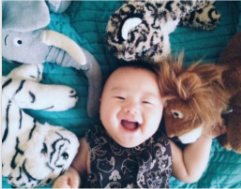 backs.
backs.This doesn’t have to be an expensive toy, sometimes the ends of a scarf or a colourful necklace you’re wearing can be really fascinating for the baby to watch.
Watch which objects they prefer.
Babies this age start to get interested in their reflection in the mirror. When you’re
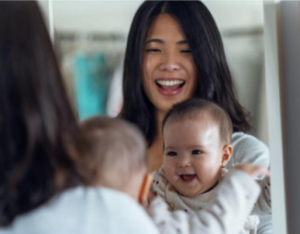 holding your baby and passing the mirror, stop for a few moments to point out their reflection.
holding your baby and passing the mirror, stop for a few moments to point out their reflection.Stand close to the mirror so your baby can see their reflection. Make funny faces and see if your baby notices. Do they realise it’s your reflection?
-
Babies often enjoy the feeling of being lifted in the air. When you’re relaxing with
 your baby, lift them over you so they’re horizontal and feel like they’re flying. Make an aeroplane noise to make this extra fun.
your baby, lift them over you so they’re horizontal and feel like they’re flying. Make an aeroplane noise to make this extra fun.Watch your baby’s expression to see what they think of it.
If your baby doesn’t make enough noise as it is, you can try drumming with them!
Sit together, each with a stick or a wooden spoon, and something to bang it on, like a light pot or container. Bang the drums and sing a nursery rhyme or a pop song to your baby. Notice which songs they particularly like.
Maybe your baby likes rap, R&B or dance music. This can depend on what music they heard you playing when you were pregnant. This is a fun way to find out what sounds your baby prefers.
Babies enjoy movement and the rhythm of songs and rhymes helps them to develop their language. Hold your baby while you dance to music or while you sing and sway. Another fun game to play is ‘horsey-horsey’.
Holding your baby on your knee jiggle them gently up and down while singing a rhyme. Try Horsey, horsey:
Horsey, horsey don’t you stop [you can put one knee up and then the other here to make your baby go from side to side. And of course stop after stop and make a funny face!]
Just let your feet go clippity clop [continue with one knee up and then the other]
Your tail goes swish and the wheels go round [now you can lift both knees up and down together]
Giddy up we’re homeward bound [hold your baby tight and really go for it here so they jiggle up and down really fast]”
Watch your baby’s reaction—are they surprised? Do they enjoy it?
If they do, you can do it again. Babies will start to anticipate the fun bits—this can get great laughs out of your baby!
You can try any rhyme or song you like for this. Try one where you let your baby slip between your knees (hold them tight and be careful you don’t drop them!). You might say something like, “Now sit still and don’t fall” and then let them slip down—make a funny face and say “Where did you go?” Tell them to sit still again but make them slip down again. Babies will find this really funny and you’ll have fun yourself too.
Babies love repetition—they like it when you do the same action over and over, and they often like to do the same action a lot too, like throwing something on the floor.
This can get pretty boring for grown-ups, but it’s really good for your baby’s learning. Try to be patient by focusing on your baby’s experience—what are they enjoying about the game? What could it be teaching them? How does it make them feel?
A great repetitive game is ’round and round the garden’, where you make circles
 on your baby’s hand, saying ’round and round the garden, like a teddy bear’.
on your baby’s hand, saying ’round and round the garden, like a teddy bear’.As you sing ‘one step, two step’, move your fingers up your baby’s arm, and then say ‘tickly under there’ as you tickle under their arm.
This can be really fun to do and it’s nice to leave a pause before you tickle to create more expectation.
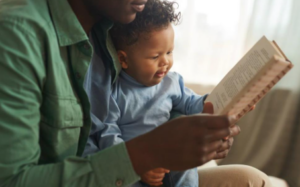 Remember to keep looking at books at every age.
Remember to keep looking at books at every age.It’s a nice opportunity to cuddle up close together, and the books provide lots of stimulation for your baby’s vision and for their movement as they learn to turn the pages. It’s also great for learning words.
As you read, notice which pages and which words they seem to like. Which book is their favourite?
-
Your baby’s understanding of objects will be developing and you can help them
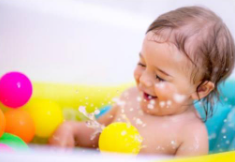 along with some play with toys.
along with some play with toys.With two plastic beakers, one each, experiment with putting different things in, and pouring them out again. You can try water if it’s in the bath. You can try sand if you’re on the beach or in the garden. Or you can try any kinds of blocks if you’re indoors.
Rattle the beaker when it is full and then pour it out making a funny noise. Help your baby to pour things from one cup to the other.
Which game is their favourite? Do they like doing this alone or with your help?
You don’t need to buy an expensive play house—most babies love playing in a cardboard box!
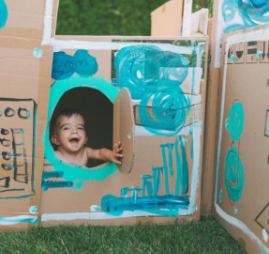 When you have a box at home, make sure there are no staples in it, and then sit it on its side so your baby can crawl in and out. Stay with them and play peekaboo by hiding your face when they go inside and then popping out to say hello. You can pretend it’s a house, or a car, and make funny driving noises.
When you have a box at home, make sure there are no staples in it, and then sit it on its side so your baby can crawl in and out. Stay with them and play peekaboo by hiding your face when they go inside and then popping out to say hello. You can pretend it’s a house, or a car, and make funny driving noises.Watch to see if they like these games. What do you think they are thinking when they go in the box? Do they know that you’re pretending?
Babies this age love putting things in containers and taking them out again.
Putting blocks or toys into a cardboard box and spilling them out again can be really fun for the baby to play and believe it or not it can help a baby to learn.
As you play this game with them, watch how they concentrate on what they are doing.
At all of these ages, babies love rhymes, songs and rhythms. Any game you’re playing can be made better by adding a silly rhyme or phrase that you repeat, like ‘up, up, up and away!’ when you’re playing aeroplanes. Or ‘in we go’ and ‘weeeeee out they fall’ when pouring things out of containers.
This creates a sense of fun for your baby and the repetition also helps with learning language. See what best captures your baby’s attention as you play together.
-
This exercise will help you learn about and appreciate your own individual baby, help you relax with your baby and learn to respond sensitively to your baby. It can help you interact with you baby at their pace and understand them better.
Try to build the exercise into each week, 5-10 minutes a day, when you’re with your baby.
Get onto the floor or the bed with your baby and watch your baby.
Let your baby take the lead/initiative.
You follow your baby’s lead.
Don’t try to teach them for the duration of this exercise, just show you are interested in what they are doing.
Let your baby explore and you respond to them.
A young baby may gaze at your face, you may watch them back, perhaps your baby pulls a face and you could respond by doing the same.
An older baby may play with some toys, you would respond by playing too but by following their lead and doing as they have done – dropping a ball, putting a piece of cloth in a tub, examining a soft toy.
Be interested in what they’re doing, watch how they may communicate with you and respond to them.
After this time think about what you noticed – what did they do? How did they communicate with you? What did you do? How did they react? If a health professional is helping you with this booklet, it can be useful to share your experiences with them. You may decide to do this exercise when that person is present. Talk about what happened and how it felt. Notice that you do not have to keep your baby entertained by initiating things to do, they enjoy you responding to them. Keep doing this exercise as it can help you build a good relationship with your baby.
-
Take time to stay connected to family and friends who you feel supported by. Share your concerns but also have moments when you can talk with them about lighter subjects. Having these moments can help you keep the energy you need to care for your baby.
If you have concerns about your mental well-being, make sure you ask for the help you need. Babies need their caregiver to be well.
Remember to call your Specialist Mother and Baby Mental Health Service (SMABS) worker for support for you and for your relationship with your baby: 01274 221180.
If you feel frustrated or find it difficult to cope with your baby or toddler, you can also speak to your Health Visitor: 01274 221223.
Have a look on the 0-19 Healthy Lives brighter Futures website, there is lots of useful information here: Home – Better Lives Healthy Futures
The best gift for your child is time shared together with you.
You can find out lots more information that will help you understand your baby at Ready to Relate – Bradford District Care NHS Foundation Trust Ready to Relate – Bradford District Care NHS Foundation Trust